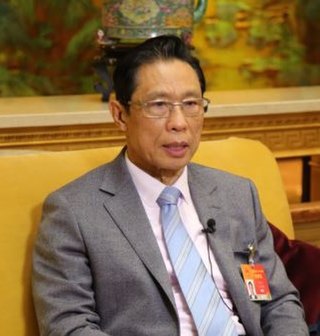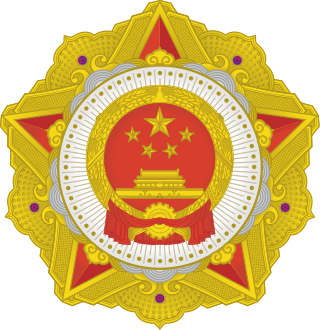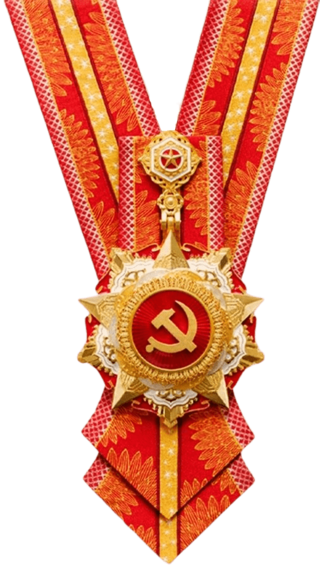
The Standing Committee of the National People's Congress (NPCSC) is the permanent body of the National People's Congress (NPC), the national legislature of the People's Republic of China. It exercises the powers of the NPC when it is not in session.
People's Artist is an honorary title in the Soviet Union, Union republics, in some other Eastern bloc states, as well as in a number of post-Soviet states, modeled after the title of the People's Artist of the USSR.
The Labour Law of the People's Republic of China is the basic labour law of China, which has been enforced since 1995. It was promulgated by the Standing Committee of the National People's Congress of China on July 5, 1994, and came into effect on January 1, 1995.

The National People's Congress (NPC) is the highest organ of state power of the People's Republic of China. The NPC is the only branch of government in China, and per the principle of unified power, all state organs from the State Council to the Supreme People's Court (SPC) are subservient to it. With 2,977 members in 2023, it is the largest legislative body in the world. The NPC is elected for a term of five years. It holds annual sessions every spring, usually lasting from 10 to 14 days, in the Great Hall of the People on the west side of Tiananmen Square in Beijing.

Zhong Nanshan is a Chinese pulmonologist. He was president of the Chinese Medical Association from 2005 to 2009 and is currently the editor-in-chief of the Journal of Thoracic Disease. He is a recipient of Medal of the Republic, the highest honour of China.

The Li Keqiang Government was the Central People's Government of China from 15 March 2013, when Premier Li Keqiang took office, until March 2023. It succeeded the Wen Jiabao government. Premier Li is ranked only second to Party general secretary Xi Jinping among 7 members of the 18th and 19th Politburo Standing Committee, top decision-making body of the Chinese Communist Party (CCP).

The Ethnic Affairs Committee of the National People's Congress is one of ten special committees of the National People's Congress. The special committee was created during the first session of the 1st National People's Congress in September 1954, and has existed for every National People's Congress except the 4th National People's Congress, during which it was suspended due to the Cultural Revolution.

The secretary-general of the Standing Committee of the National People's Congress is a deputy to the chairman of the Standing Committee of the National People's Congress, responsible for assisting the chairman in his work. The secretary-general is responsible for overseeing the operations of the NPCSC General Office.

The President of the People's Republic of China, commonly called the President of China, is the state representative of the People's Republic of China, which on its own is a ceremonial office and has no real power in China's political system. However, since 1993, the post has been held by the general secretary of the Chinese Communist Party (CCP) and chairman of the Central Military Commission, who is China's de facto leader.
The following is a list of the orders and medals issued by the People's Republic of China since its founding. The Working Committee of Party and State Merit and Honour Commendation is responsible for coordinating the work of Party and state merit and honor commendation.

The Medal of the Republic is the highest honorary medal of the People's Republic of China. The bestowal is decided by the Standing Committee of the National People's Congress and presented by the President of China. According to law, this medal is bestowed on "outstanding individuals who have made great contributions and established outstanding merits in the construction of socialism with Chinese characteristics and defense of the country."

Huai Jinpeng is a Chinese computer scientist and politician. He is the current Minister of Education, party secretary of the China Association for Science and Technology (CAST) and an academician of the Chinese Academy of Sciences.

The August 1 Medal is the highest military medal of the People's Republic of China bestowed on military personnel of China. The bestowal is decided by the Central Military Commission and presented by the Chairman of the Central Military Commission. According to law, this medal is awarded to "military personnel who have made great contributions and established outstanding meritorious service in safeguarding national sovereignty, security, and development interests, and promoting the modernization of national defense and the military, and have had a profound impact on the country and the entire military." It is awarded every five years.

The July 1 Medal is the highest honorary medal of the Chinese Communist Party. The bestowal is decided by the Central Committee and presented by the General Secretary of the Central Committee. It was established on 22 July 2017. According to the party's bylaw, the medal is bestowed on "party members who have made outstanding contributions and created valuable spiritual wealth in the great cause of socialism with Chinese characteristics and the new great project of party construction."
People's assessors system is a part of the Judicial system of China.

Isabel Crook was a Canadian-British anthropologist, political prisoner, and professor at Beijing Foreign Studies University. Crook conducted anthropological studies in China and played an instrumental role in foreign language education in China.
Chen Junwu was a Chinese engineer and an academician of the Chinese Academy of Sciences (CAS).
The Council of Chairpersons of the Standing Committee of the National People's Congress is a body which handles the daily affairs of the Standing Committee of the National People's Congress (NPCSC), which is the permanent body of the National People's Congress (NPC), the national legislature of China. It is composed of the chairman, the vice chairpersons, and the secretary-general of the NPCSC. It holds more frequent meetings than the NPCSC.
The Chinese language law, full name Law on the Standard Spoken and Written Language of the People’s Republic of China, is the first specialized law on spoken and written language in China. This law was adopted at the 18th meeting of the Standing Committee of the Ninth National People's Congress on October 31, 2000, and came into effect on January 1, 2001. The law stipulates the scope, norms and standards for the use of the country's common spoken and written language. According to this law, the national standard spoken and written language is Mandarin Putonghua and standardized Chinese characters.










